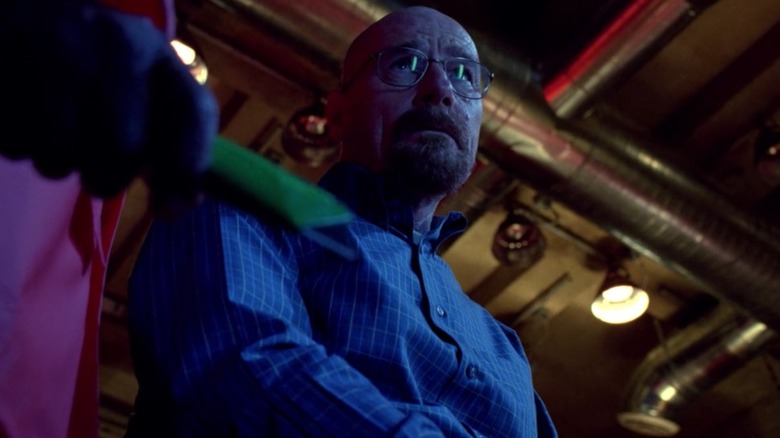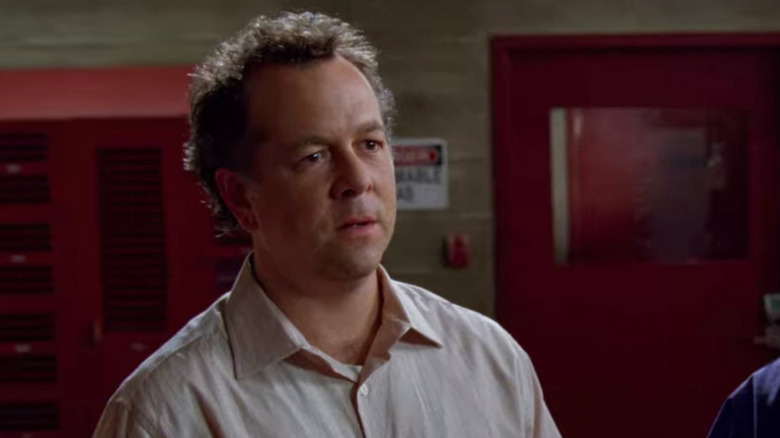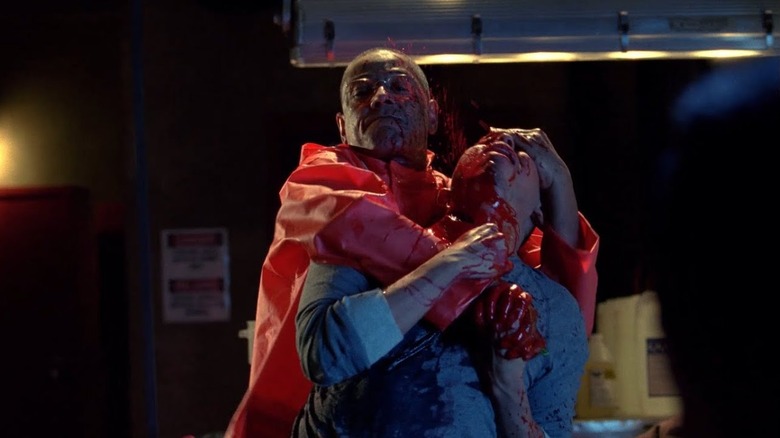AMC
In the dark world of “Breaking Bad”, our main antagonist, Walter White/Heisenberg (Bryan Cranston), stands as the ultimate representation of evil. However, if there is anyone who can stand toe-to-toe with him and almost topple his reign, it is the drug lord Gustavo “Gus” Fring (Giancarlo Esposito). Gus, a Chilean immigrant with a shrouded past, is the amiable, philanthropic figurehead of the fried chicken chain Los Pollos Hermanos. But this amicable facade merely conceals a merciless criminal mastermind. Beneath his icy exterior lies a burning vengeance; his involvement in the meth business is not purely for monetary gain but also to obliterate the cartel leadership that brutally murdered his lover Max (James Martinez).
Thanks to the massive success of “Breaking Bad”, Esposito’s career will forever be tied to Gus, whether he’s playing Stan Edgar in “The Boys”, Moff Gideon in “The Mandalorian”, or reprising his role as Gus Fring in the prequel series “Better Call Saul”, despite initial hesitations to revisit the character.
Apart from his unforgettable death scene in the “Breaking Bad” season 4 finale “Face Off”, Gus is most notorious for his brutal execution of his subordinate Victor (Jeremiah Bitsui) in the season 4 premiere “Box Cutter”. This gruesome event was so notorious that it was humorously referenced in a “Better Call Saul” viral short, which poked fun at Gus’ impeccable fashion sense:
The scene is set up in such a way that it appears Gus is about to kill Walt and Jesse (Aaron Paul), making it even more shocking when he instead murders his faithful underling in front of them. The brilliance of “Breaking Bad” lies in its ability to convey the story without spoon-feeding the audience, boasting a perfect blend of masterful storytelling, respectful treatment of the audience, and cinematic visuals.
However, if you’re simply watching passively or distracted by your phone (just as Netflix expects!), you might be as perplexed as Walt, Jesse, and Mike (Jonathan Banks) are. So, what led Gus to kill Victor? Note that “all of the above” could possibly be the answer here.
Gus killed Victor to intimidate Walt and Jesse

AMC
Within the context of “Box Cutter”, the most straightforward interpretation of the scene is this: In the season 3 finale, “Full Measure”, Gus intended to have Walt and Jesse killed for their defiance. In response, Jesse assassinated Gus’ other meth cook Gale Boetticher (David Costabile), thus ensuring their survival as indispensable employees.
While Gus cannot kill them, he cannot let their disobedience go unpunished. He chooses to execute Victor as a surrogate punishment, forcing Walt and Jesse to witness his agonizingly slow death, serving as a stern reminder of their potential fate if they continue to defy him.
Introduced in “Breaking Bad” season 2 episode 11 “Mandalas”, Gus Fring is portrayed as a careful criminal, maintaining his hidden status for decades by keeping a safe distance from his illicit operations. Victor’s execution signifies a turning point for Gus, as he begins to get his hands dirty. As a criminal mastermind and cleanliness freak, he dons an orange clean-up suit to prevent any blood or evidence from contaminating his clothes.
Witnessing their boss murder Victor makes Walt and Jesse fully aware of his capabilities; not only can he order deaths, but he can also personally execute them swiftly, efficiently, and painfully. This serves as a deterrent to any potential show of bravado induced by their meth-cooking skills.
But doesn’t killing a loyal henchman like Victor seem wasteful for someone like Gus? Could this potentially send the wrong message to Mike, who also witnesses the murder, making him question the value of his loyalty? It’s important to remember that Victor was not without fault at this moment.
Gus killed Victor because he was seen at Gale’s murder scene

AMC
In “Box Cutter”, Victor rushes to Gale’s apartment but arrives too late to prevent Jesse from executing him. Three other tenants observe him as he enters Gale’s apartment and then quickly leaves after confirming Gale’s demise. This suspicious activity is certainly memorable and would likely be reported to the police. To make matters worse, Victor leaves his car at the scene and returns to the lab at gunpoint in Jesse’s car.
Upon Jesse’s return to the lab, Victor is interrogated by Mike. When asked if anyone saw him, Victor avoids answering, indicating his awareness of his mistake. Mike continues to press him, leading Victor to admit that he was seen but downplays the significance of it, claiming he was “just another looky-loo”.
Both Gus and Mike are known for their meticulous operations, so it’s safe to assume that Mike informed Gus about Victor being seen. Keeping Victor alive posed a significant risk to Gus’ operation as his identification could lead the police to Gus. Therefore, Gus eliminates Victor to remove this liability.
While this might seem extreme, Gus is not one to take unnecessary risks. A sketch of a wanted poster featuring Victor’s likeness is later seen in “Hermanos” when Gus is questioned about his ties to Gale. From a crime boss’s perspective, Gus made the right decision in removing Victor from his operation.
But did Victor make another misstep that sealed his fate? Walt seems to think so.
Gus killed Victor for attempting to cook meth

AMC
As Walt, Jesse, Mike, and Victor await Gus’ arrival, Victor attempts to demonstrate their expendability by cooking a batch of the infamous Blue Sky meth himself, having observed Walt and Jesse’s process numerous times.
Victor’s death is mentioned one final time in “Breaking Bad” season 5, after Walt and Jesse have freed themselves from Gus and Walt has assumed the role of drug kingpin. At the end of the third episode, “Hazard Pay”, Walt, Jesse, and Mike finish dividing the first profits of their new drug empire. A disagreement arises over the “Legacy cost”, or the cost of maintaining the silence of Gus’ now-incarcerated henchmen. Mike subtracts this cost from their collective earnings
Credit: www.slashfilm.com


